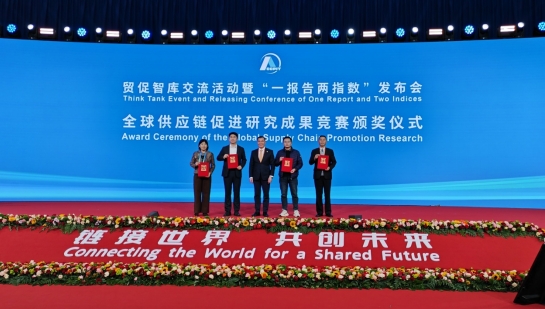The 2nd China International Supply Chain Expo (CISCE) began on November 26, featuring a variety of events, including the Trade Promotion Think Tank Exchange and the unveiling of the “One Report, Two Indices.” At the awards ceremony for the Global Supply Chain Promotion Research Competition, a report titled “Enhancing the Quality of Green Agricultural Supply Chains under China-Pakistan Economic Corridor: A Case Study of the Pakistan-China Chili Project” earned third prize in the Business Advocacy Award category. This report was co-authored by Professor Song Zhihui from Sichuan University’s Pakistan Study Center and Dr. Liu Yajing from China Agricultural University.
Professor Song Zhihui emphasized the importance and strategic value of their research in improving green agricultural supply chains under the China-Pakistan Economic Corridor (CPEC). He explained that their case study on the Pakistan-China chili project highlighted the crucial role of green agriculture in global supply chains. Green agriculture, he noted, is essential for enhancing product quality, promoting sustainability, addressing environmental crises, and advancing agricultural modernization.
Dr. Liu Yajing pointed out that the recognition from the China Council for the Promotion of International Trade (CCPIT) reflects the depth of analysis and innovation by leading enterprises. Moreover, it underscores the promising potential for agricultural cooperation within the framework of CPEC.
Additionally, the study identified agriculture as a vital area for bilateral collaboration, leveraging the complementary strengths of China and Pakistan. Through knowledge-sharing and technological innovation, the two countries can tackle economic challenges, raise farmer incomes, and foster sustainable development. The chili project exemplifies this partnership, combining Pakistan’s agricultural resources with China’s expertise in supply chain management to generate significant value.
However, the study also highlighted challenges in the CPEC bilateral supply chain, including poor infrastructure, high transportation costs, differing product standards, and limited information-sharing systems. These issues pose barriers to efficient cross-border operations, especially amid global economic uncertainties, underscoring the need for resilient supply chains.
Overcoming Challenges
Furthermore, to overcome these challenges, the researchers suggested several solutions: enhancing infrastructure, implementing specialized training programs, investing in e-commerce and digital platforms, and strengthening policy coordination between China and Pakistan. These measures aim to reduce costs, improve efficiency, and deepen economic ties.

Moreover, the chili project, spearheaded by Sichuan Puji Holdings Co., Ltd., stands as one of the first agricultural initiatives launched under CPEC, showcasing the potential for innovative partnerships in sustainable agriculture.
Related Posts

















